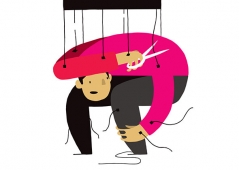Free will without metaphysics
 How do people understand free will? (picture by Alex Eben Meyer, www.eben.com)Free will is big news these days. It is turning up in the New York Times, NPR, Slate, car commercials, and in two excellent 2009 pieces in this very blog (found here and here). Yet, despite the resurgence of interest in free will, there remains confusion and disagreement regarding free will’s role in social life, in particular, how people understand free will and whether free will guides blame and praise for others.
How do people understand free will? (picture by Alex Eben Meyer, www.eben.com)Free will is big news these days. It is turning up in the New York Times, NPR, Slate, car commercials, and in two excellent 2009 pieces in this very blog (found here and here). Yet, despite the resurgence of interest in free will, there remains confusion and disagreement regarding free will’s role in social life, in particular, how people understand free will and whether free will guides blame and praise for others.
In this blog post I argue that we need to pay closer attention to the folk concept of free will in order to resolve the confusion surrounding free will in everyday life.
Focus on belief, not truthiness
Questions about the nature of free will have been debated by philosophers since Aristotle, and recently physicists, neuroscientists, and psychologists have joined the fray; yet, consensus on the question of what free will truly is remains elusive (for example, one philosophy journal recently published a compilation of 30 views on free will).
An alternative to attempting to answers questions about what free will truly is would be to examine the folk concept of free will—that is, how everyday people conceptualize free will and how they apply this concept to guiding their behavior and judgments of others.
As a social psychologist, I find questions about the folk concept more interesting than questions about the true nature of free will. This is because regardless of the “truth value” of free will (i.e., whether we truly have it or not), the folk concept is what actually guides people’s behavior. Similarly so, God may or may not exist, finding proof one way or the other has remained elusive, yet the belief in God has a profound impact on people’s behavior (e.g., Shariff & Norenzayan, 2007).
Thus, it may be true that none of us really have free will, but that “truth” hardly matters when I’m trying to decide whether I should have that extra slice of chocolate cake after a large dinner or when my wife blames me for leaving the bathroom light on yet again. What matters in both of these cases are our beliefs about our own and others’ free will.
The need to study, not speculate about the folk concept of free will
So, how do people conceptualize free will? One popular view among scholars is that people’s concept of free will is corrupted by hopeless metaphysics or magical beliefs. Some argue that the folk concept requires mind-body dualism (Bloom, 2007). Others claim that people’s concept of free will relies on a belief in the soul (Bargh & Earp, 2009; Cashmore, 2010), and this separation of mind from body allows human choice to break the normal laws of causality (Bayer, Ferguson, & Gollwitzer, 2003; Nichols, 2004).
To be more concrete, the type of free will people supposed believe in is akin to a domino that can choose whether it will fall over or not after being struck by a preceding domino. Human will is (supposedly) a cause in itself, above and divorced from the effects of all prior causes and all the laws of physics.
It would be truly disturbing if there were scientific evidence to back these claims. Fortunately, these assertions about the folk concept originate largely from the philosopher’s armchair, not the laboratory. But, before we charge people with holding a corrupted concept of free will, we need scientific evidence.
The folk concept of free will
In a first study on the topic, Bertram Malle and I (2010) probed people’s concept of free will by asking a simple question: “what do you think it means to have free will.” People defined free will in terms of being able to make choices, acting consistent with one’s desires, and being (reasonably) free of coercion (We have since replicated this finding in an interview study with community participants, see Monroe & Malle, in press).
To most, this definition probably seems intuitive, almost obvious; however, this definition clashes with conventional wisdom regarding people’s concept of free will. People don’t mention souls, dualism, or many of the other philosophical issues that are frequently raised in free will debates. Also, this answer alleviates some of the longstanding questions surrounding free will. Do people think we actually have free will? Yes, at least to the extent that we are rational and uncoerced.
Yet, critics might object that while people explicitly define free will in psychologically tractable terms (e.g., choice, lack of coercion), their implicit theory of free will is still metaphysical, and it is a metaphysical concept – like the concept of a soul, mind-body dualism, and so forth - that guides people’s judgments and behavior.
Free will and blame
Fortunately, this is an empirical question. A recent series of studies compared the efficacy of the psychological and metaphysical concepts of free will for guiding moral judgments of blame (Monroe, Dillon, & Malle, 2014). In these studies, we presented participants one of several different types of human and robotic agents who committed various norm-violating behaviors (e.g., theft, acts of mayhem), and we asked participants to evaluate whether the agent (1) had free will and (2) deserved blame for committing the norm-violating behaviors. To test the two psychological and metaphysical models of free will we manipulated the agent descriptions so that the agents varied in their capacity for choice (a key requirement for the psychological concept) and in having a soul (a key requirement for the metaphysical concept). We then examined whether the capacity for choice or having an uncaused soul predicted free will ascriptions and blame judgments.
The data supported the psychological concept of free will. Ascriptions of choice strongly predicted participants’ willingness to attribute free will (r2 = .41) and blame (r2 = .52) to an agent. As a comparison, SAT scores predict college freshman GPA at r2 = .30 (Sackett et al., 2012). By contrast, ascriptions of metaphysical qualities (souls or being an uncaused cause) failed to predict blame judgments (r2 = .0) and only weakly predicted free will ascriptions (r2 = .07). Thus, it seems that at least people’s everyday practice of assigning blame for wrongdoing is guided by a psychological concept of free will.
However, there is still much more work to be done. There are important questions regarding the generalizability of this folk concept, as nearly all studies on the folk concept have focused on Western samples. Additionally, it is possible that people maintain some lurking metaphysical commitments in their concept of free will that have yet to be uncovered. Finally, some skeptics might argue that people’s concept of free will pertains only to the experience of making choices, while the actual choice process is not “freely willed” (see Wegner, 2002). The empirical investigation of the folk concept of free will has only just begun, and hopefully new research will work towards answering these questions.
References:
Bargh, J. A., & Earp, B. D. (2009). The will is caused, not “free.” Dialogue, Newsletter of the Society for Personality and Social Psychology, 24, 13–15.
Bayer, U. C., Ferguson, M. J., & Gollwitzer, P. M. (2003). Voluntary action from the perspective of social personality psychology. In S. Maasen, W. Prinz, & G. Roth (Eds.), Voluntary Action: Brains, Minds, and Sociality (pp. 86–107). New York, NY US: Oxford University Press.
Bloom, P. (2007). Religion is natural. Developmental Science, 10, 147–151. doi:10.1111/j.1467-7687.2007.00577.x
Cashmore, A. R. (2010). The Lucretian swerve: The biological basis of human behavior and the criminal justice system. Proceedings of the National Academy of Sciences, 107, 4499–4504. doi:10.1073/pnas.0915161107
Monroe, A. E., Dillon, K. D., & Malle, B. F. (2014). Bringing free will down to earth: People’s psychological concept of free will and its role in moral judgment. Manuscript in press.
Monroe, A. E., & Malle, B. F. (in press). Free will without metaphysics. In A. R. Mele (Ed.), Surrounding free will. New York, NY: Oxford University Press.
Monroe, A. E., & Malle, B. F. (2010). From uncaused will to conscious choice: The need to study, not speculate about people’s folk concept of free will. Review of Philosophy and Psychology, 1, 211–224. doi:10.1007/s13164-009-0010-7
Nichols, S. (2004). Folk concepts and intuitions: from philosophy to cognitive science. Trends in Cognitive Sciences, 8, 514–518. doi:10.1016/j.tics.2004.09.001
Sackett, P. R., Kuncel, N. R., Beatty, A. S., Rigdon, J. L., Shen, W., & Kiger, T. B. (2012). The role of socioeconomic status in SAT-grade relationships and in college admissions decisions. Psychological Science, 23, 1000–1007. doi:10.1177/0956797612438732
Shariff, A. F., & Norenzayan, A. (2007). God is watching you: Priming god concepts increases prosocial behavior in an anonymous economic game. Psychological Science, 18, 803–809. doi:10.1111/j.1467-9280.2007.01983.x
Wegner, D. M. (2002). The illusion of conscious will. Cambridge, MA: MIT Press.

